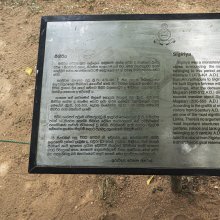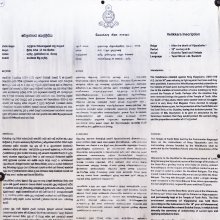Avata, Avāta, Avaṭa: 15 definitions
Introduction:
Avata means something in Hinduism, Sanskrit, Buddhism, Pali, the history of ancient India, Marathi. If you want to know the exact meaning, history, etymology or English translation of this term then check out the descriptions on this page. Add your comment or reference to a book if you want to contribute to this summary article.
Images (photo gallery)
In Hinduism
General definition (in Hinduism)
Source: archive.org: Vedic index of Names and SubjectsAvata (अवत, “well”), a word occurring several times in the Ṛgveda, denotes a well, artificially made (khan ‘to dig’) in contrast with a spring (utsa), though the latter expression is also applied to an artificial well. Such wells were covered by the makers, and are described as unfailing (akṣita) and full of water. The water was raised by a wheel (cakra) of stone, to which was fastened a strap , with a pail (kośa) attached to it. When raised it was poured (siñc) into buckets (āhāva) of wood. Sometimes those wells appear to have been used for irrigation purposes, the water being led off into broad channels.
India history and geography
Source: Cologne Digital Sanskrit Dictionaries: Indian Epigraphical GlossaryĀvāta.—(IE 8-5), same as vāta, storm; cf. udvāta. (EI 32; CII 3; etc.), a fiscal term referring to the income from lands as a result of changes caused by natural agencies; an income probably resulting from storms. See vāta, probably meaning ‘a storm or tempest’; also āvāta-aya. Note: āvāta is defined in the “Indian epigraphical glossary” as it can be found on ancient inscriptions commonly written in Sanskrit, Prakrit or Dravidian languages.

The history of India traces the identification of countries, villages, towns and other regions of India, as well as mythology, zoology, royal dynasties, rulers, tribes, local festivities and traditions and regional languages. Ancient India enjoyed religious freedom and encourages the path of Dharma, a concept common to Buddhism, Hinduism, and Jainism.
Languages of India and abroad
Pali-English dictionary
Source: BuddhaSasana: Concise Pali-English Dictionaryāvaṭa : (pp. of āvarati) covered; veiled; prohibited. || āvāṭa (m.), a pit.
Source: Sutta: The Pali Text Society's Pali-English DictionaryĀvāṭa, (etym. ?) a hole dug in the ground, a pit, a well D. I, 142 (yaññ°); J. I, 99, 264; II 406; III, 286; IV 46 (caturassa); VI, 10; DhA. I, 223; VvA. 63; PvA. 225. (Page 112)
— or —
Āvaṭa, (Sk. āvṛta, pp. of ā + vṛ) covered, veiled, shut off against, prohibited D. I, 97, 246; M. I, 381 (°dvāra); J. VI, 267. —anāvaṭa uncovered, unveiled, exposed, open D. I, 137 (°dvāra); III, 191 (°dvāratā); S. I, 55; J. V, 213; Pv III, 64; Miln. 283. Cp. āvuta2 & vy°. (Page 111)

Pali is the language of the Tipiṭaka, which is the sacred canon of Theravāda Buddhism and contains much of the Buddha’s speech. Closeley related to Sanskrit, both languages are used interchangeably between religions.
Marathi-English dictionary
Source: DDSA: The Molesworth Marathi and English Dictionaryavaṭa (अवट).—m A pile of timbers as prepared for a building: also of logs or billets for fuel.
--- OR ---
avaṭa (अवट).—m R avaṭāṇa n R (Commonly ōhaṭa) The ebb-tide.
--- OR ---
avaṭā (अवटा).—m Drawing up in dudgeon or sulks; sulking. v dhara.
--- OR ---
avāta (अवात).—n C (ava & vāta) A tempest, storm, high wind. 2 fig. A sudden and great calamity. 3 (a & vāta) A calm.
--- OR ---
āvaṭa (आवट).—m A pile of timbers (as prepared for a building): also of logs or billets for fuel.
Marathi is an Indo-European language having over 70 million native speakers people in (predominantly) Maharashtra India. Marathi, like many other Indo-Aryan languages, evolved from early forms of Prakrit, which itself is a subset of Sanskrit, one of the most ancient languages of the world.
Sanskrit dictionary
Source: DDSA: The practical Sanskrit-English dictionaryAvaṭa (अवट).—a. [ava-aṭan] Produced in a hole.
-ṭaḥ 1 A hole, cavity.
2) A pit; क्रौञ्चावटे (krauñcāvaṭe) Rām.6.17.6; अवटे चापि मे राम प्रक्षिपेमं कलेवरम् (avaṭe cāpi me rāma prakṣipemaṃ kalevaram); अवटे ये निधीयन्ते (avaṭe ye nidhīyante) Rām. विपाटयन्निव जगद् दंष्ट्राट्टालघटावटैः (vipāṭayanniva jagad daṃṣṭrāṭṭālaghaṭāvaṭaiḥ) Bm.1.762.
3) A well.
4) Any low or depressed part of the body, sinus; अवटश्चैवमेतानि स्थानान्यत्र शरीरके (avaṭaścaivametāni sthānānyatra śarīrake) Y.3.98.
5) A juggler.
6) Drunk; the commentary of Mahendra on Hemachandra's Anekārthasaṃgraha प्रमत्तेऽपि मङ्खः यथा अवटातङ्कसंकेतनिकेतनसमाश्रयाम् (pramatte'pi maṅkhaḥ yathā avaṭātaṅkasaṃketaniketanasamāśrayām)
--- OR ---
Avata (अवत).—[ava-aṭac vede pṛṣo °ṭasya taḥ] A well, cistern.
Derivable forms: avataḥ (अवतः).
--- OR ---
Avāta (अवात).—a. [na. ba.]
1) Windless, not shaken by wind; मिहं कृण्वन्त्यवाताम् (mihaṃ kṛṇvantyavātām) Ṛgveda 1.38.7.
2) Not breathing the air.
3) Not exposed to, or not dried up by wind; fresh; शुष्मा इन्द्रमवाता अह्नुतासवः (śuṣmā indramavātā ahnutāsavaḥ) Ṛgveda 1.52.4.
4) Unattacked, unconquered (Ved.).
-tam The windless atmosphere; आनीदवातं स्वधया तदेकम् (ānīdavātaṃ svadhayā tadekam) Ṛgveda 1.129.2.
Source: Cologne Digital Sanskrit Dictionaries: Shabda-Sagara Sanskrit-English DictionaryAvaṭa (अवट).—m.
(-ṭaḥ) 1. A hole, a vacuity. 2. A hole in the ground, a chasm, a pit. 3. Any depressed part of the body, a cavity, a fosse, a sinus. 4. A well. 5. A juggler. E. ava to preserve, aṭan aff.
Source: Cologne Digital Sanskrit Dictionaries: Benfey Sanskrit-English DictionaryAvaṭa (अवट).—m. A pit, [Rāmāyaṇa] 3, 8, 19.
--- OR ---
Avata (अवत).—m. A well,
--- OR ---
Avāta (अवात).—(m. or n.), absence of wind, quiet, [Lassen, Anthologia Sanskritica.] 97, 11 = [Rigveda.] vi. 64, 4.
Avāta is a Sanskrit compound consisting of the terms a and vāta (वात).
Source: Cologne Digital Sanskrit Dictionaries: Cappeller Sanskrit-English DictionaryAvaṭa (अवट).—[masculine] hole, pit; [adjective] yya being in a pit.
--- OR ---
Avata (अवत).—[masculine] well, cistern.
--- OR ---
Avāta (अवात).—1. [adjective] unconquered, secure.
--- OR ---
Avāta (अवात).—2. [adjective] not windy. [neuter] calm.
Source: Cologne Digital Sanskrit Dictionaries: Monier-Williams Sanskrit-English Dictionary1) Avaṭa (अवट):—m. a hole, vacuity in the ground, [Sāma-veda; Vājasaneyi-saṃhitā] etc.
2) a hole in a tooth, [Varāha-mihira’s Bṛhat-saṃhitā]
3) any depressed part of the body, a sinus, [Yājñavalkya iii, 98]
4) a juggler, [cf. Lexicographers, esp. such as amarasiṃha, halāyudha, hemacandra, etc.]
5) Name of a man, ([gana] gargādi q.v.)
6) Avata (अवत):—[from avaḍa] a m. a well, cistern, [Ṛg-veda] (cf. avatka.)
7) b See above sub voce avaṭa.
8) Avāta (अवात):—[=a-vāta] 1. a-vāta mf(ā)n. (√vai), not dried up, fresh, [Ṛg-veda i, 52, 4; 62, 10 and viii, 79, 7.]
9) [=a-vāta] 2. a-vāta mf(ā)n. windless, [Ṛg-veda i, 38, 7]
10) [v.s. ...] n. the windless atmosphere, [Ṛg-veda vi, 64, 4 and x, 129, 2.]
11) [=a-vāta] 3. a-vāta mf(ā)n. (√van), unattacked, untroubled, [Ṛg-veda]
Source: Cologne Digital Sanskrit Dictionaries: Yates Sanskrit-English DictionaryAvaṭa (अवट):—(ṭaḥ) 1. m. A hole; a well.
Source: DDSA: Paia-sadda-mahannavo; a comprehensive Prakrit Hindi dictionary (S)Avaṭa (अवट) in the Sanskrit language is related to the Prakrit words: Agaḍa, Aḍa, Ayaḍa, Avaḍa, Avatta, Uttara.
[Sanskrit to German]
Sanskrit, also spelled संस्कृतम् (saṃskṛtam), is an ancient language of India commonly seen as the grandmother of the Indo-European language family (even English!). Closely allied with Prakrit and Pali, Sanskrit is more exhaustive in both grammar and terms and has the most extensive collection of literature in the world, greatly surpassing its sister-languages Greek and Latin.
Kannada-English dictionary
Source: Alar: Kannada-English corpusAvaṭa (ಅವಟ):—
1) [noun] a hole or hollow place.
2) [noun] a cavity in the ground.
3) [noun] a hollow place inside the earth, usu.,an opening, as in a hillside, extending horizontally; a cave.
4) [noun] a skilful-trick performer of sleight of hand with (balls, knives, etc.) as by keeping a number of them in the air continuously.
5) [noun] a hole or shaft sunk into the earth to tap an underground supply of water, gas, oil, etc; a well.
--- OR ---
Āvaṭa (ಆವಟ):—
1) [noun] the extent, dimensions, capacity, etc. of anything, esp. as determined by a standard; a measure.
2) [noun] the act or process of determining, extent, dimensions, quantity, capacity etc.
--- OR ---
Āvaṭa (ಆವಟ):—[noun] an appearance, show or act to deceive; pretentiousness.
Kannada is a Dravidian language (as opposed to the Indo-European language family) mainly spoken in the southwestern region of India.
See also (Relevant definitions)
Starts with (+97): Avata maamidi, Avata-aya, Avata-javata, Avatabhavata, Avatad, Avatadana, Avatai, Avataisu, Avatajavata-garnu, Avatakacchapa, Avatakachchhapa, Avataki, Avatakshana, Avatal, Avatala, Avatalam, Avatalanem, Avatam, Avatamasa, Avatamnka.
Ends with (+532): Abhinavabhagavata, Aciravata, Adacavata, Adavata, Adhmanavata, Adhyakaravata, Adhyatmabhagavata, Adhyavata, Agastyavata, Agauravata, Agravata, Aibhavata, Airanyavata, Airavata, Aishtakavata, Ajavamjavata, Ajavata, Ajjavata, Akalavata, Akhudavata.
Full-text (+66): Agada, Avati, Avatya, Avatas, Yannavata, Avatoda, Avatka, Avatakacchapa, Ada, Avatita, Avatam, Avata-aya, Avatavirodhana, Avata maamidi, Avatu, Uccabudhna, Samudavata, Avaghatta, Kevata, Anavata.
Relevant text
Search found 18 books and stories containing Avata, Avāta, Avaṭa, Āvāṭa, Avaṭā, Āvaṭa, Āvāta, A-vata, A-vāta; (plurals include: Avatas, Avātas, Avaṭas, Āvāṭas, Avaṭās, Āvaṭas, Āvātas, vatas, vātas). You can also click to the full overview containing English textual excerpts. Below are direct links for the most relevant articles:
Rig Veda (translation and commentary) (by H. H. Wilson)
Satapatha-brahmana (by Julius Eggeling)
Kāṇḍa VI, adhyāya 5, brāhmaṇa 4 < [Sixth Kāṇḍa]
The Skanda Purana (by G. V. Tagare)
Chapter 187 - The Greatness of Kālāgnirudra Tīrtha < [Section 3 - Revā-khaṇḍa]
Sahitya-kaumudi by Baladeva Vidyabhushana (by Gaurapada Dāsa)
Text 10.82 < [Chapter 10 - Ornaments of Meaning]
Chandogya Upanishad (Madhva commentary) (by Srisa Chandra Vasu)
Vedic influence on the Sun-worship in the Puranas (by Goswami Mitali)
Part 2 - Sūrya (The God of Atmosphere) < [Chapter 2 - Salient Traits of the Solar Divinities in the Veda]
Related products


